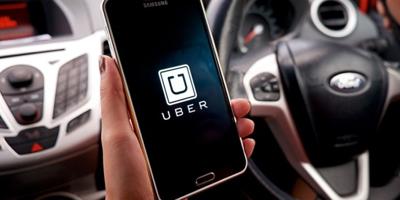
SAN FRANCISCO - The federal government is suing Uber in San Francisco, alleging the company violated Title III of the Americans with Disabilities Act by letting its drivers deny service to people with disabilities, notably those with service animals or wheelchairs.
The U.S. Department of Justice filed the 34-page complaint Friday seeking $125 million it says would go to people who have submitted complaints to Uber or the government.
According to the complaint, Uber is the nationwide leader in ride-sharing transportation and has contracted for paratransit services with at least two dozen local governments. But the DOJ alleged Uber drivers “routinely refuse service” to passengers with disabilities and levy improper charges, such as cleaning fees to riders with service animals and cancellation fees when the driver refuses service.
“And Uber’s drivers insult and demean people with disabilities or ask them inappropriate questions,” according to the complaint.
The complaint’s other allegations include refusal to make reasonable modifications, such as letting a passenger with a mobility impairment ride in the front seat or refusing to remove rider credit caps so the company can reimburse for improperly charged fees. The DOJ referenced allegations from 17 different Uber customers, with claims that included screenshots of drivers arriving to pick up riders using a guide dog then driving off and canceling the ride and stories of missed flights.
In a statement, Uber said it disputes the claims in the federal lawsuit. The company says it requires drivers to agree to its access policies, including its policies related to service animals, and takes action, including deactivation, against drivers found to have violated those policies.
The company has said it also offers riders the ability to report denial of service, including through a service animal denial hotline available round the clock.
“Riders who use guide dogs or other assistive devices deserve a safe, respectful, and welcoming experience on Uber—full stop. We have a clear zero-tolerance policy for confirmed service denials, and we fundamentally disagree with the DOJ’s allegations,” Uber said in its statement.
“Every driver must acknowledge and agree to comply with our U.S. Service Animal Policy and all applicable accessibility laws before using the Uber Driver app, and we regularly remind drivers of these obligations. When we confirm a violation, we take decisive action, including permanent account deactivation.
“We continue to invest in technology, training, and dedicated reporting channels—such as a 24/7 service animal denial hotline—to ensure riders can quickly alert us so we can investigate and address issues. We remain deeply committed to expanding access and continuously improving the experience for riders with disabilities.”
In the federal complaint, a San Jose resident said three different drivers rejected the same request in November 2023, causing her to miss an appointment. In March 2025, the same customer was in Washington, D.C., for an American Council of the Blind leadership conference. As a corporate sponsor, Uber offered attendees $25 vouchers, but the driver who accepted her request refused to transport the service dog despite the customer and a conference volunteer informing the driver denial of service was illegal. The driver didn’t cancel the ride through the app, so when the customer canceled the request Uber assessed a $5 cancellation fee.
Another customer, a Gulf War veteran whose chronic nerve damage means he cannot stand for more than 10 minutes, could not get an Uber driver to take him to an airport in Virginia and had to rent a car for the 16-hour drive back to Massachusetts. In addition to the missed flight and rental fees, the drive aggravated the customer’s symptoms to the point where he could not walk or stand, leaving him substantially bedridden for five days. Uber allegedly offered him a $15 account credit.
“Rideshare companies like Uber are prohibited from denying riders with disabilities the same access to transportation that riders without disabilities enjoy,” said U.S. Attorney Craig H. Missakian of the Northern District of California. “This complaint underscores the United States’ commitment to enforcing the ADA’s promise of equal access.”
The government — which claims “Uber receives thousands of complaints each year” — said it notified Uber of its investigation, after which the company deployed a feature letting riders tell drivers they would be traveling with a service animal, but that development didn’t deter the alleged discriminatory conduct.
“For too long, blind riders have suffered repeated ride denials by Uber because they are traveling with a service dog,” said Assistant Attorney General Harmeet K. Dhillon of the Justice Department’s Civil Rights Division. “This lawsuit seeks to end this persistent discrimination and allow riders with disabilities to use Uber. We will enforce the ADA’s guarantee that people with disabilities have equal opportunity and full participation in all aspects of American society, including transportation.”
The DOJ wants a judge to declare Uber in violation of the ADA, formally order the company to stop any discriminatory practices, provide training to all employees and drivers on ADA requirements and issue “monetary damages, including compensatory damages for emotional distress, pain and suffering, and other injuries.” The government further seeks a civil penalty and asked to litigate the matter before a jury.
Jonathan Bilyk contributed to this report.








